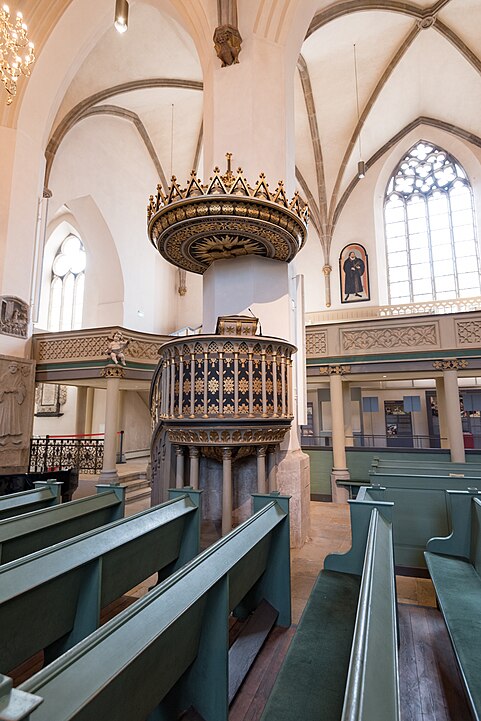I suppose we shouldn’t say “Happy Ash Wednesday!” or “Merry Lent!” Nor should we say “Somber Ash Wednesday!” or “Guilt-ridden Lent!” The season we are entering is more nuanced than either, making it perhaps the most spiritually fruitful time of the church year.
I looked online for proper Lenten greetings. “Have a blessed and reflective Lent” is too stilted. “Have a Holy Lent” is pretty good. The best one I found is what Arab Christians say: “Blessed Fast!”
Anyway, back on Sunday March 9, 1522–exactly 503 years ago this very Sunday–Martin Luther began preaching his so-called Invocavit sermons. The first Sunday of Lent goes by that name, the Latin for “He shall call,” which comes from the first words of the Introit for the day: “He shall call upon me, and I will answer him” (Psalm 91:15; KJV). Luther preached every day for that first week of Lent, because his church was in a state of chaos.
Luther’s recovery of the gospel of free forgiveness of sins through faith in Christ electrified Europe, especially his own city of Wittenberg. After his “Here I stand” moment at Wurms, the Emperor dubbed him an outlaw, to be killed on sight, but the ruler of Wittenberg, Frederick the Wise, who was one of the eight “Electors” who voted on who would be the Emperor and so could claim a certain authority over him, staged a fake kidnapping of Luther and spirited him away to the castle of Wartburg. Here, disguised as a knight named George, Luther began his great work of translating the Bible into the language of the people.
But in Wittenberg, the people, exhilarated by the freedom they felt in the gospel, erupted. Mobs attacked priests and nuns. They ransacked churches, burning the crosses, smashing the stained glass windows, and destroying other religious art, all in the name of getting rid of “idols.” Church leaders like the scholarly Melanchthon were powerless to stop them, while some of those leaders, such as university professor Andreas Karlstadt egged them on. In the course of the social social reforms he tried to implement, he renounced his three doctoral degrees and told the students of Wittenberg University to quit their studies and just go home.
Hearing about the tumult, Luther left the safety of Wartburg Castle and came out of hiding, at great risk to his life. Later, Luther would write that heresies and false religions should not be dealt with by coercion, much less the use of the sword and the stake as was common in those days. (I marvel that Duke Frederick refrained from using his army to put down the disorder, but he was probably as confused as everyone else.) Rather, the church must do so with preaching.
So that’s what Luther did. Feelings were high on every side, the city was polarized, with everybody angry, violence was breaking out everywhere, so Luther preached.
Pastor Michael Schuermann wrote about this in 2016 in a post entitled Loving Your Neighbor in Lent (Wittenberg). In the Invocavit sermons, says Pastor Schuermann, “we see a pastoral approach that is expressly concerned with the consciences of the people of Wittenberg. Luther wanted to make sure that the people turned aside from a developing fanatical desire to serve God by keeping commandments of men, and instead serve God by believing the Gospel and loving their neighbors.”
Pastor Schuermann quotes and summarizes the first sermon:
Luther begins in an ear-opening manner: “The summons of death comes to us all, and no one can die for another. Every one must fight his own battle with death by himself, alone.”
Luther first preaches the Law:
“In the first place, we must know that we are the children of wrath, and all our works, intentions, and thoughts are nothing at all…Note this well; and though there are many such in the Bible, I do not wish to overwhelm you with many texts. ‘We are all the children of wrath.’”
And then he preaches the Gospel:
“God has sent us his only-begotten Son that we may believe in him and that whoever trusts in him shall be free from sin and a child of God, as John declares in his first chapter, ‘To all who believed in his name, he gave power to become children of God.’”
Whereupon he preaches how that Gospel bears fruit in love for one’s neighbor:
“Thirdly, we must also have love and through love we must do to one another as God has done to us through faith. For without love faith is nothing, as St. Paul says (I Cor. 2 [13:1]): If I had the tongues of angels and could speak of the highest things in faith, and have not love, I am nothing. And here, dear friends, have you not grievously failed? I see no signs of love among you, and I observe very well that you have not been grateful to God for his rich gifts and treasures.”
Luther goes on in this vein–tightening the screws, relieving fears, inspiring change–for the rest of this and the other seven sermons. The City Church, St. Mary’s, was packed every day. Luther addressed the controversies, calling for a reformation of the church that does not destroy what is valuable in the church, but stressing concern for the “weaker brethren” (cf. Romans 14).
The result was immediate. The chastened city calmed down. Order was restored. The Reformation proceeded in a more careful, measured way. And Wittenbergers did, at least to a degree, start loving their neighbors.
You can read the Invocavit sermons, which are surprisingly short, here.
I’d like to commend to you a series of devotions edited by Rev. Andrew Guagenti, with other pastors contributing, entitled The Word Worth Dying For: Lenten Devotions with Martin Luther’s 1522 Invocavit Sermons.
They consist of short passages drawn from the sermons, plus a Bible text and a prayer. There is a devotion for each day of Lent. You can read them online, or print them as attractively designed week-by-week booklets.
You could make these part of your Blessed Fast.
Photo: Luther’s pulpit in St. Mary’s Church, Wittenberg By Tilman2007 – Own work, CC BY-SA 4.0, https://commons.wikimedia.org/w/index.php?curid=72255801














